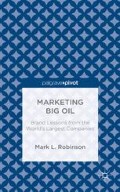Abstract
In 1911, the U.S. Supreme Court dissolved the Standard Oil Trust which for the past 40 years had become a virtual monopoly not only in oil refining into kerosene, but also in manufacturing its own oil barrels, railroad tank cars, and oil pipelines. Even though the company was dissolved, its corporate offspring, Exxon, Mobil, Chevron, and Amoco, became Fortune 500 companies. Their profitability grew due to the invention of the gasoline engine, gasoline powered cars, the expansion of the U.S. highway system, and the development of the retail gasoline station.
Access this chapter
Tax calculation will be finalised at checkout
Purchases are for personal use only
Preview
Unable to display preview. Download preview PDF.
Notes
B. Bringhurst. Antitrust and the Oil Monopoly: The Standard Oil Cases, 1890–1911. (Greenwood: Westport, CT, 1979), pp. 20, 32-33.
Author information
Authors and Affiliations
Copyright information
© 2014 Mark L. Robinson
About this chapter
Cite this chapter
Robinson, M.L. (2014). The End of One Oil Empire and the Beginning of Another: 1905–1911. In: Marketing Big Oil: Brand Lessons from the World’s Largest Companies. Palgrave Macmillan, New York. https://doi.org/10.1057/9781137388070_5
Download citation
DOI: https://doi.org/10.1057/9781137388070_5
Publisher Name: Palgrave Macmillan, New York
Print ISBN: 978-1-349-48226-9
Online ISBN: 978-1-137-38807-0
eBook Packages: Palgrave Business & Management CollectionBusiness and Management (R0)

